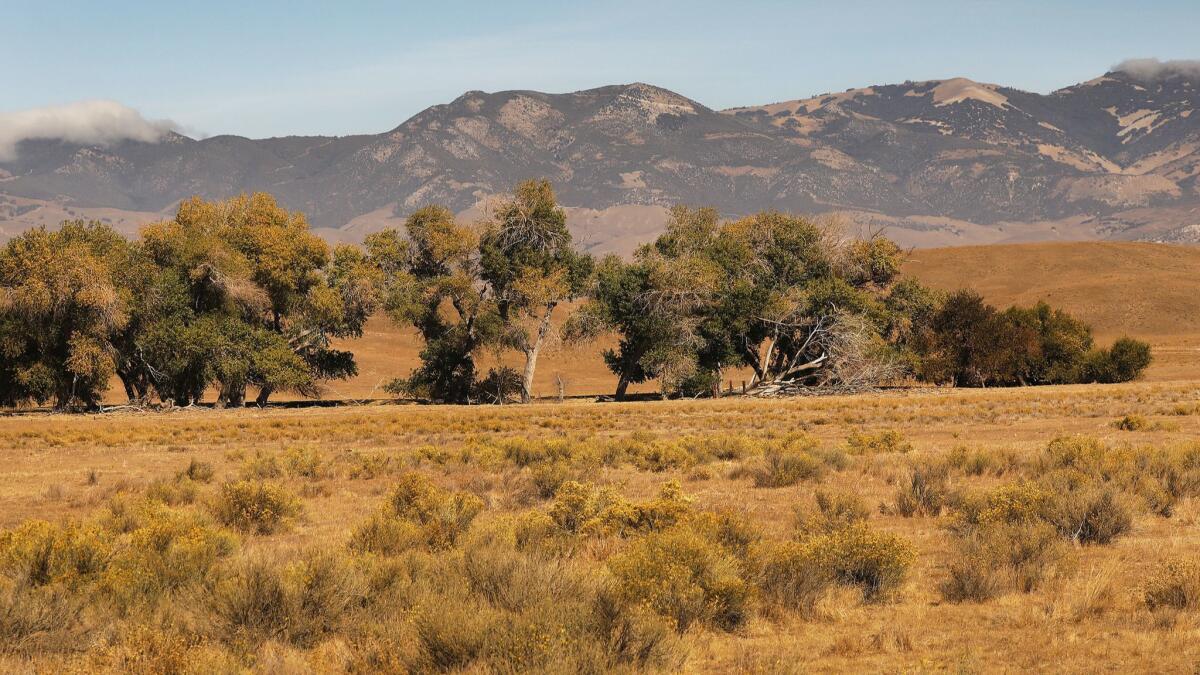Supervisors OK 19,000-home development at Tejon Ranch

- Share via
After nearly 20 years of planning, the Los Angeles County Board of Supervisors on Tuesday approved a massive development near the Tejon Pass that has become a centerpiece of the debate over how California should develop in an era of worsening wildfires and growing urban sprawl.
The Centennial project would add 19,000 homes in the northwestern corner of Los Angeles County, a sparsely populated area 70 miles from downtown L.A. that is also far from other job centers.
The development has pitted environmental groups, which argue it will destroy an important natural habitat and worsen greenhouse gas emissions as residents commute by car to faraway cities, against a private landowner and residents who say it will bring badly needed housing and services to the region.
The vote on the project also comes on the heels of catastrophic wildfires that tore through the communities of Paradise, Calif., and Malibu, raising questions about whether homes in the state should continue to be built in fire-prone areas near wildland.
All of the Centennial project site would sit within “high” and “very high” fire hazard severity zones as identified by state officials.
Backers said Centennial is designed to address many of critics’ concerns.
“This is not just another ‘sprawl’ project,” said Supervisor Kathryn Barger, who represents the district where Centennial will be located.
She said the development will help meet the state’s housing needs, create long-term jobs and go “above and beyond” existing environmental requirements.
The vote was 4 to 1, with Supervisor Sheila Kuehl casting the dissenting vote.
“I can’t support it. I think it is not a good idea to build a brand-new city so far away from everything else — because of the fire concern, because I don’t quite understand and believe the affordable housing promises” and because of the environmental impacts, she said.
More than 100 people spoke about the development at the public hearing Tuesday.
Supporters included real estate developers, business associations, building trades representatives and residents of nearby Gorman and the Antelope Valley. Some of them had been invited and were provided lunch by the Tejon Ranch Co., the publicly traded owner and developer of the project land.
“Centennial … is a prime example of development that boosts our economy,” said Bill Allen, chief executive of the L.A. County Economic Development Corp.
Opponents included several members of the California Native Plant Society, which has been blacklisted from Tejon Ranch, other environmental advocates and private citizens.
“If I were a supervisor, I would not want the deaths of Centennial residents on my conscience,” said Clifford McLean of the plant society, referring to the area’s fire hazard.
Some urban planners, land-use experts and ecologists have said the project’s location in a fire-prone area alone should compel officials to reevaluate the project and their priorities, but the Tejon Ranch Co. and county planning staff have said fire risk at the site can be reduced through safer building standards and good overall planning.
“I remain deeply concerned about all communities located in high fire [hazard] severity zones and stand ready to act as swiftly as we can to ensure protection of life and structures,” Barger said.
But, she said, houses at Centennial will be built with flame-resistant materials and surrounded by appropriate “fuel modification” zones.
“These will not be 50- to 60-year-old buildings with wood construction, shake roofs, within close proximity to large stands of pine trees found on hillsides and canyons,” she said.
The Centennial site is mostly flat grassland, though it also encompasses oak woodlands and some steep terrain. The 270,000-acre Tejon Ranch traverses a variety of ecosystems, including desert and mountain landscapes with Joshua trees, pine forests and wildflower fields that are home to California condors, mountain lions, black bears and elk.
The Regional Planning Commission voted 4 to 1 in August to recommend that the Board of Supervisors certify the project’s environmental impact report and sign off on the associated land-use plans and permits, with additional conditions that the developer set aside 15% of the units for affordable housing and commit to 30% local hiring for construction.
Another point of contention Tuesday was the affordability of homes at Centennial. The developer has said the price of a single-family house would range from $425,000 to $550,000.
“That ... is out of reach for people that are working at minimum wage or are homeless,” Supervisor Hilda Solis said.
She insisted the developer increase the project’s affordable housing set-aside to 20%, but later agreed to compromise of 18%.
Tejon Ranch spokesman Barry Zoeller said in an interview after the meeting that the company was “obviously pleased” with its outcome.
“We believe that the plan put forth will help make a dent in L.A.’s housing crisis,” he said.
The project will come back to the board for one final procedural vote after the county’s attorneys prepare the necessary documents.
Zoeller said the Tejon Ranch Co. is prepared to fight expected litigation.
Twitter: @AgrawalNina
More to Read
Sign up for Essential California
The most important California stories and recommendations in your inbox every morning.
You may occasionally receive promotional content from the Los Angeles Times.











